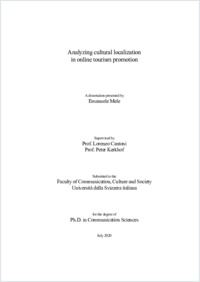Analyzing cultural localization in online tourism promotion
- Mele, Emanuele
- Cantoni, Lorenzo (Degree supervisor)
- Kerkhof, Peter (Degree committee member)
-
30.10.2020
164 p.
Thèse de doctorat: Università della Svizzera italiana, 2020 (jury note: Magna cum laude)
English
Tourism and culture are strongly intertwined. People can experience culture before, during and after their journey, both in the offline and in the online world. Arguably, the internet is among the main sources of inspiration and information retrieval for tourists, who navigate social media and websites to know more about the destination, its products and services. Following the developments in tourism communication and marketing fostered by information and communication technologies, researchers as well as practitioners have been approaching the issue of cultural difference in multiple ways. Among them, localization describes the adaptation of online content and design to meet the culture-bound preferences of a specific international audience. While marketing studies argue for the benefits of this practice, there has been little research within the e-tourism domain. Addressing this gap, the present PhD thesis examines the practice of localization and its implications from the perspective of the Online Communication Model (OCM) (Tardini & Cantoni, 2015), which is composed of four main pillars: web content, design, managers, and online visitors. More precisely, Chapter 2 aims at providing an overview of localization within the tourism domain, arguing on its advantages and limitations, along with its implications for web content and design. This objective was achieved by triangulating academic research and industry reports with examples of cultural adaptation from destination websites. Chapter 3 investigates whether and how heritage tourism promotion on Instagram varies across cultures. This objective was achieved by performing both a manual and an automated content analysis of 1744 Instagram posts published by the national tourism organizations of four culturally different destinations: Chile, Portugal, USA, and Netherlands. Following this exploratory research, Chapter 4 explores the integration of localization practices within the online communication strategy developed by destination marketing organizations (DMOs), by interviewing 11 marketing managers and IT specialists from national tourism organizations – members of the European Travel Commission. Addressing cultural adaptation from a demand perspective, Chapter 5 analyzes the effect of localizing cultural values on online visitor’s perceived image and willingness to visit a heritage site, via two highly powered experiments with a total of 2039 participants from two culturally distant European countries: Portugal and United Kingdom. Lastly, the methodologies of both Chapter 3 (for the analysis of cultural values) and Chapter 5 (for the creation of the stimuli) relied on a qualitative research (Annex) that investigated how cultural values were conveyed by visuals from European destination’s websites. Overall, findings show that localization extends to a wide spectrum of possible customizations in terms of content and design, which include the adaptation of cultural values (cultural cues) expressed by multimedia content. Even though the Internet has arguably erased geographical borders, cultural orientations appear to be largely reflected on Instagram, a popular social network for tourism promotion. In this regard, interviews reveal that DMOs are aware of cultural differences and cope with them by integrating localization activities within their online marketing strategy, with important consequences for content production and distribution. Finally, experimental findings show that, within the European context, the localization of cultural values for heritage tourism promotion leads to limited benefits (at best) in terms of online visitor’s perceived image and willingness to visit – suggesting a high tolerance of participants toward incongruent cultural values. Providing a substantial contribution to both theory and practice, this PhD thesis sheds light on cross-cultural differences in a globalized online world and how tourism destinations perform localization activities to tackle these issues. Lastly, findings pose critical questions regarding the benefits of localizing cultural values and its limitations in tourism promotion.
- Language
-
- English
- Classification
- Economics
- License
-
License undefined
- Identifiers
-
- RERO DOC 329751
- URN urn:nbn:ch:rero-006-118929
- ARK ark:/12658/srd1319229
- Persistent URL
- https://n2t.net/ark:/12658/srd1319229
Statistics
Document views: 656
File downloads:
- Texte intégral: 759
